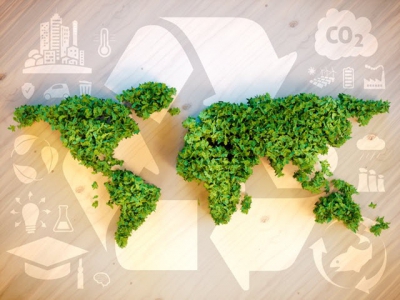Researchers making protein-rich yeast biomass out of thin air

A yeast biomass based on CO2 and other non-fossil resources could be commercially available by early 2021, giving the feed industry a ‘carbon-neutral’ protein source.
Austrian researchers have succeeded in feeding yeasts with CO2, enabling the development of a yeast biomass that can potentially be used as a sustainable alternative to agriculturally produced protein-rich feed sources such as soy.
Several research teams worldwide are working to identify a method of feeding yeasts with CO2 from air – a challenge for many reasons, among them the thermodynamic stability of this molecule.
Researchers at the University of Natural Resources and Applied Life Sciences (BOKU) Vienna and the Austrian Centre of Industrial Biotechnology (ACIB) have conceived a technology coined ‘Carbofeed’ that emulates reactions that take place during photosynthesis, with ‘compartmentalization’ a key feature.
Copying the Calvin Cycle
“In nature, plants utilize the energy delivered by sunlight to incorporate CO2 in their biomass via the so-called Calvin Cycle. This process takes place in compartmentalized regions of the plant cell, the chloroplasts. We were able to mimic this process in a similar compartment found in yeast, which is naturally used for utilization of methanol,” Dr Michael Egermeier, one of the four researchers involved in the Carbofeed project, told FeedNavigator.
“Additionally, we use (bio-)methanol as the energy source to fuel this process. Production of methanol from CO2 and other non-fossil resources is an emerging technology which enables us to produce carbon-neutral yeast biomass. The use of methanol is necessary, as the yeast requires the energy equivalents to incorporate CO2 in its biomass,” explained Dr Egermeier.
The use of yeasts in animal feed is not a new concept – yeast produced as a by-product by breweries and distilleries has been channeled into feed for more than a century. Formulation of the biomass often includes cell crushing and drying to produce a protein-rich powder that is directly applied as feed additive.
As a result, many studies have proven the digestibility and beneficial health effects of yeast biomass as a protein source in animal farming and aquaculture.
With the threat of global food security, animal feed sources that don’t occupy agricultural land or contribute to climate change are highly sought after.
"In contrast to protein-rich feed additives like soybean meal the yeast-based process yields a product free of any pesticides, which requires less agricultural space and has a higher content of available proteins and vitamins (e.g. natural B-vitamins). An increasing demand for protein-rich feed and limited land for agricultural use are drivers for the development of alternative protein sources,” said Dr Egermeier.
Higher yields
He explained that the main advantage of the Carbofeed technology versus existing yeast biomass production processes is that in a conventional yeast process on methanol around 50% of the carbon (in methanol) is lost due to respiration in the form of CO2.
“Our yeast therefore reaches higher biomass yields on methanol - this is the big advantage,” he said.
The researchers have been awarded Spin-Off Fellowship financing by the Austrian Research Promotion Agency (FFG), which promotes the development of university spin-offs, with the aim of bringing the project to market maturity.
“Our goal is to optimize the production process of our yeast biomass based on non-fossil resources (bio-)methanol and CO2 within this timeframe. Large-scale production trials and market entry are intended for early 2021,” said Dr Egermeier, adding that the researchers would also test other possible ‘green’ substrates during the funding period.
Related news
 Vietnam coffee prices unchanged; Indonesian premium widens
Vietnam coffee prices unchanged; Indonesian premium widens Vietnam’s domestic coffee prices were unchanged on Thursday from a week earlier as trade has almost come to a halt ahead of a major harvest beginning next month
 Asia Rice-Firm rupee lifts Indian rates; Vietnam prices hold near 12-year low
Asia Rice-Firm rupee lifts Indian rates; Vietnam prices hold near 12-year low Top exporter India’s 5% broken parboiled variety RI-INBKN5-P1 rose to around $373-$379 per tonne from $370-$376 a week ago
 Customers' preference helps Vietnamese foods foray deeper into Thai market
Customers' preference helps Vietnamese foods foray deeper into Thai market Coffee, cashew and some fruit from Vietnam are tastier, Thai consumers say as Vietnamese foods make inroads into a tough market.